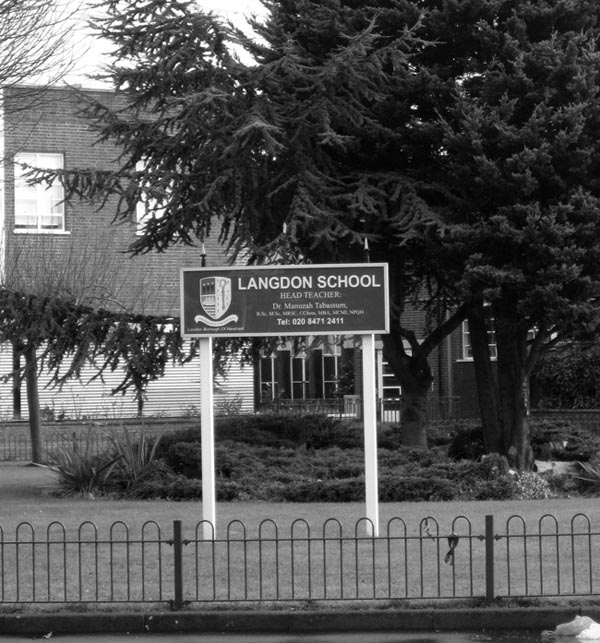East London teachers fight
WORKERS, JAN 2012 ISSUE
Backed wholeheartedly by the National Union of Teachers, 78 striking teachers at Langdon School in Newham, east London, have waged a significant struggle against excessive workload and oppressive management – a growing problem in many schools. Following 10 days of strikes stretching over a number of weeks, an agreement was reached which enabled the union to suspend industrial action scheduled for 14, 15 and 20 December, and future planned actions in January.

Langdon School, Newham.
Attempts to solve the problems by discussion and negotiation began in the previous academic year, but got nowhere owing to management intransigence. A first strike led to increased belligerence from the head and resulted in the suspension of several members of the leadership team, members of the NUT unhappy at the deterioration in leadership style. There were two references of the dispute to ACAS conciliation. After the first meeting, the union thought an agreement had been reached but it was never acted upon by the head teacher or by sections of the local authority. Instead, when intensified strike action followed (three days of strike on consecutive weeks), the head teacher recruited outside agency staff and used cover supervisors to replace the strikers on the days of the dispute.
Recruiting agency staff to replace strikers would have been illegal, so in order to allow it to take place, Labour-run Newham council intervened disgracefully by giving the agency staff temporary employment contracts for the days of the strike. This crude attempt at strike breaking not only increased strikers’ morale but also antagonised teachers throughout the borough, who voted to request that the union consider involving them in a general trade dispute.
At the second ACAS meeting, the council became more constructively involved and an agreement was suggested, but the Langdon strikers rejected it, as it did not contain enough safeguards for them and contained too many loopholes favourable to the head. Half a dozen points were suggested for union negotiators to take back. As strikes resumed, the LA made a revised offer which was recommended by union negotiators and the school reps, and which proved acceptable to the strikers. Then the strike action was suspended and the teachers returned to work.
The agreement means that there will be: an independent survey on workload and oppressive management, with NUT input on questions, to be referred to the LA; a mechanism for dealing with the 28 existing workload issues, involving the LA and governors; the appointment of a senior leader, to whom staff will have access, to work in school at least 2 days a week; and a mechanism for referring school-based disputes to the LA and NUT. This approach will considerably strengthen the NUT group’s position in the coming months.
At the peak of support from parents and at its strongest in terms of the action (the number of strikers had continued to grow), the NUT group felt that with this agreement the time had come to get back inside school in order to maintain their strong links with their students. Though the strike action has been suspended in order to progress the dispute, it has not been called off. There is still a live ballot and there will be a return to strike action if is needed. The teachers remain in dispute and anticipate being so for months yet.
This dispute proves that collective action works: considerable gains have been made that were only possible because the union group was willing to stand firm in the face of massive bullying and strike-breaking attempts. A solid and united strike was maintained in very difficult circumstances. Also, there was brilliant support from the NUT at all levels: school, association, London Region, national officials and national executive members. The action has shown that the NUT is a union that fights for its members and stands up to bullies at work. The school group has been transformed with new members, new strikers, new pickets, new speakers and new organisers. The strikers have shown enormous solidarity and have complete confidence in one another. Morale is high and many lessons have been learned. ■